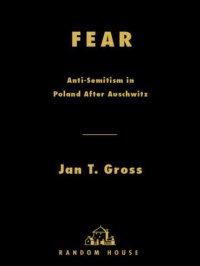
Ebook: Fear: anti-semitism in Poland after Auschwitz: an essay in historical interpretation
Author: Gross Jan Tomasz
- Tags: Antisemitism--Poland--History--20th century, Antisemitismus, Jews--Persecutions--Poland--Kielce, Juden, Pogrom, Pogroms--Poland--Kielce--History--20th century, SOCIAL SCIENCE--Discrimination & Race Relations, SOCIAL SCIENCE--Minority Studies, Communism--Poland, Holocaust Jewish (1939-1945)--Influence, Pogroms, Antisemitism, Communism, Ethnic relations, Influence (Literary artistic etc.), Jews--Persecutions, History, Antisemitism -- Poland -- History -- 20th century, Pogroms -- Poland -- Kielce -- History -- 2
- Year: 2006
- Publisher: Random House Publishing Group
- City: New York;Juden;Kielce;Kielce (Poland);Poland;Polen
- Edition: 1st ed
- Language: English
- mobi
Poland suffered an exceedingly brutal Nazi occupation during the Second World War. Close to five million Polish citizens lost their lives as a result. More than half the casualties were Polish Jews. Thus, the second largest Jewish community in the world-only American Jewry numbered more than the three and a half million Polish Jews at the time-was wiped out. Over 90 percent of its members were killed in the Holocaust. And yet, despite this unprecedented calamity that affected both Jews and non-Jews, Jewish Holocaust survivors returning to their hometowns in Poland after the war experienced widespread hostility, including murder, at the hands of their neighbors. The bloodiest peacetime pogrom in twentieth-century Europe took place in the Polish town of Kielce one year after the war ended, on July 4, 1946. Jan Gross's Fear attempts to answer a perplexing question: How was anti-Semitism possible in Poland after the war? At the center of his investigation is a detailed reconstruction of the Kielce pogrom and the reactions it evoked in various milieus of Polish society. How did the Polish Catholic Church, Communist party workers, and intellectuals respond to the spectacle of Jews being murdered by their fellow citizens in a country that had just been liberated from a five-year Nazi occupation? Gross argues that the anti-Semitism displayed in Poland in the war's aftermath cannot be understood simply as a continuation of prewar attitudes. Rather, it developed in the context of the Holocaust and the Communist takeover: Anti-Semitism eventually became a common currency between the Communist regime and a society in which many had joined in the Nazi campaign of plunder and murder-and for whom the Jewish survivors were a standing reproach. Jews did not bring communism to Poland as some believe; in fact, they were finally driven out of Poland under the Communist regime as a matter of political expediency. In the words of the Nobel Prize-winning poet Czeslaw Milosz, Poland's Communist rulers fulfilled the dream of Polish nationalists by bringing into existence an ethnically pure state.;Poland abandoned -- The unwelcoming of Jewish survivors -- The Kielce pogrom: events -- The Kielce pogrom: reactions -- Blinded by social distance -- Zydokomuna.
Download the book Fear: anti-semitism in Poland after Auschwitz: an essay in historical interpretation for free or read online
Continue reading on any device:

Last viewed books
Related books
{related-news}
Comments (0)